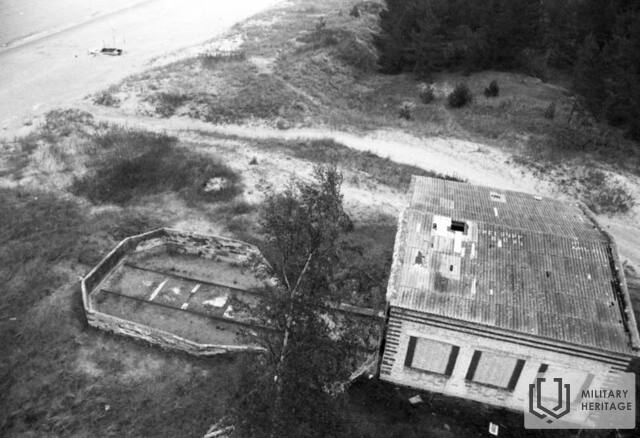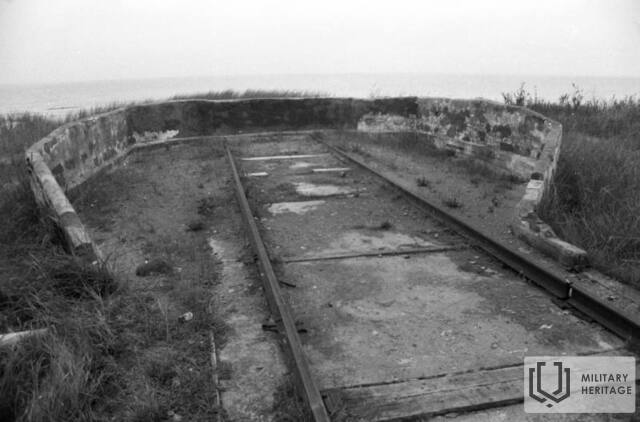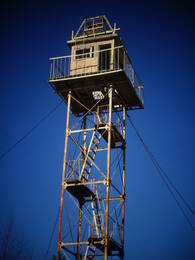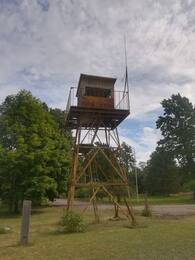Prisiminimai iš pasienio zonos
Įvairios scenos iš gyvenimo sovietmečiu, kaip jas prisimena rašytojas, prozos ir poezijos autorius Gunārs Anševicas, gyvenęs pasienio zonoje.
Rusų laikais prie jūros negalėjai eiti kada ir kur tik panorėjęs. Didžiosios jūros pusėje, priešais kiekvieną kaimą, buvo tam tikra kelių šimtų metrų ilgio juosta, už kurios ribų nebuvo leidžiama rodytis. Laikas taip pat buvo ribotas: nuo gegužės iki spalio pradžios, nuo devynių ryto iki dešimtos vakaro.
Dažnai pasitaikydavo, kad iš šienaujamos pievos grįžę pavargę ir suprakaitavę žmonės norėdavo atsigaivinti jūroje, bet – per vėlu! – jiems nebuvo leista. Tačiau aš niekada taip atidžiai nežiūrėjau. Pasitaikydavo, kad kareiviai nepataikydavo, bet jei pavykdavo, mes bandydavome paaiškinti, kas nutiko, ir dažnai pavykdavo su jais susitarti. Bet, oi, kokie galingi tuo metu jautėsi pasieniečiai, o kokie pažeminti jautėsi vietos kaimo gyventojai! Šis įvykis yra to įrodymas.
Kartą atvykau į Mazirbę su ožka, pasiėmiau ją ant krūtinės ir miško keliuku nuvažiavau iki namų. Pasienio apsaugos poste už tvoros keli kareiviai kasė didelę duobę, o pats vadas majoras taip pat ten sukiojosi. Jis buvo latgalas, gerai mokėjo latviškai, bet kalbėjo ja tik išimtiniais atvejais. Buvau geros nuotaikos, ir man šovė mintis. Pasmaugiau ožką, pririšau ją prie kelio pušies ir nuėjau į žalumą. Priėjęs prie majoro, bandydamas užimti kažkokią karinę poziciją, bet vis dar svirduliuodamas nuo girtumo, nelabai mikliai išleisdamas kelis rusiškus skiemenis, pranešiau: „Tas-varišč, majore! Razrešiķe obrakhitsya!“ Visi kareiviai apsisuko kaip vienas ir žiūrėjo, sakykit, ką čia veikia tas girtas eilinis? Šiek tiek liūdnu (specialiai surežisuotu) balsu rusiškai pasakiau karininkui, kad sergu gana rimta odos liga, kad ją gerai gydyti jūros vandeniu, bet, na, sezonas greitai baigsis, ir aš nebegalėsiu važiuoti į pajūrį, bet būtų taip gera retkarčiais kibirą parsinešti namo... Majoras atidžiai manęs klausėsi, aukščiau pastūmė skrybėlę, sunėrė rankas už nugaros ir, pastebimai neskubėdamas, liepė man vaikščioti pirmyn ir atgal, tarsi galvodamas apie kažką svarbaus ir ne kartą sau kartodamas: „Na, ką tu stoboi poļelaješ!“ Galiausiai jis priėmė lemiamą sprendimą ir rusiškai paklausė: „Kokia buvo tavo pavardė? O, Anševič! Tuomet, štai, Anševič, išimties tvarka mes tave pasivysime ir tau padėsime! Į pajūrį gali nueiti bet kuriuo paros metu. Tačiau prie kareivių paliktų pėdsakų, kur jie eina pasivaikščioti, nupiešk didžiąją raidę „A“. Ir šiek tiek ištiesęs batais apautusią koją, mėgdžiojo raidės piešimą. Visa tai man priminė baronų laikus, apie kuriuos skaičiau knygose ir mačiau filmuose – jei tinkamai paprašydavai pono, jis dažnai dosniai leisdavo.“
Daug kartų teko susidurti su kareiviais, beveik visada dėl paso atėmimo. Kadangi tai buvo saugoma teritorija, keliuose dažnai vykdavo dokumentų kontrolė. Mane iš autobuso išlaipino turbūt apie dešimt kartų – tiek saugomoje teritorijoje, tiek pasienyje. Kiekvieną kartą sukeldavau nedidelių nepatogumų kitiems keleiviams, o ypač savo giminaičiams, kurie keliavo kartu su manimi. Nieko blogo nenutiko; kol pasieniečiai skambino ir tikrino mano tapatybę, autobusas laukė apie penkias minutes, kol mane paleido.
Kartą patekau į absurdišką situaciją ir buvau išlaipintas visai netoli namų, Saunagase. Tuo metu ten, matyt, buvo keletas nemalonių jaunuolių, norėjusių išsiskirti. Be ilgesnių kalbų, nepaisant kitų autobuse važiavusių darbuotojų protestų, mane ir dar du žmones pasodino į bobiką ir nuvežė į Saunago policijos nuovadą. Ten praleidome tris valandas, dauguma soldžiukų man buvo gerai pažįstami, nes dažnai žaisdavome su jais tinklinį ir futbolą. Tarp čomų jaučiausi beveik kaip namie, bet vis tiek buvau sulaikytas... Galiausiai, sutvarkius kelis formalumus, buvome paleisti namo. Buvo tamsus, vėlyvas, lietingas rudens vakaras. Kai pasiekėme Pitragą, buvome šlapi ir permirkę kaip piemenys, bet vienam iš mūsų trijų vis tiek teko eiti pėsčiomis iki Mazirbės.
Kai mano dukrai Sanitai buvo treji ar ketveri metai, tamsoje, vėlyvą vakarą važiuodavome prie jūros slapta stebėti, kaip specialiu automobiliu atvykę pasieniečiai lėtai siunčia labai galingą šviesos spindulį virš jūros. Staiga kažkas sušlamėjo, sulojo šuo, ir nakties tamsoje, jūros dangaus fone, pasirodė du vyrai karinga poza su automatais rankose, šalia jų – šuo. Matyt, atvykę žmonės tikrai manė, kad šuo įkando sienos pažeidėjui. Tamsą perskrodė ryškus šviesos spindulys, jie mus nuvedė prie automobilio, kurį laiką kalbėjausi telefonu su majoru, man nereikėjo važiuoti į Mazirbę vien dėl to, kad su savimi turėjau vaiką... Man buvo liepta niekada nedaryti tokių dalykų. Tamsoje, žmonės su ginklais... skubėdami ir bijodami gali visko nutikti.
Niekada gyvenime sąmoningai nebandžiau patekti į rizikingas situacijas, bet paso nepasiėmimas buvo išimtis. Nebent man absoliučiai reikėjo paso, jo beveik niekada su savimi neturėdavau. Darbininkų autobuse, kur dažnai tikrindavo dokumentus, bet paprastai sėdėti lauke neleisdavo, visi jau žinojo: kai kareiviai atvykdavo pas Gunarą, prasidėdavo didesnis ar mažesnis šurmulys, nes jis neturėdavo dokumentų... Man tai, nors ir vaikiška bei berniokiška, vis tiek buvo savotiškas maištas prieš šią kvailą, žeminantį sistemą: esu vietinis gyventojas, mano protėviai čia gyvena šimtmečius, ir kiekviename žingsnyje turiu rodyti pasą kokiam nors užsienio okupantui! Tai buvo savotiškas atkakliai nepalenkiamas pasipriešinimas ir pasididžiavimas – neturiu su savimi paso, ir tiek! Šis žaidimas man niekada nepabosdavo, be to, kuo toliau ėjau, tuo labiau jis man patikdavo.
Laikraštis "TALSU VĒSTIS" 2006 m. rugsėjo 16 d. Nr. 8 - atsiuntė Inese Roze (Talsų apskrities turizmo informacijos centras)
Susijusi laiko juosta
Susijusios vietos
Mazirbės pasienio apsaugos bokštas
Sovietinis pasienio apsaugos postas buvo įsikūręs pastate, kuriame anksčiau buvo jūreivystės mokykla, o šalia jo yra gerai išsilaikęs sovietinis pasienio sargybos bokštas. Antrasis sargybos bokštas yra tiesiai ant kranto, šalia automobilių stovėjimo aikštelės. Šie sargybos bokštai primena sovietų okupaciją ir laikus, kai Mazirbė buvo uždara pasienio zona, o civiliai gyventojai krante buvo leidžiami tik specialiai tam skirtose vietose ir tik dienos metu. Šis pasienio sargybos bokštas yra vienas geriausiai išsilaikiusių tokio tipo objektų Latvijos pakrantėje. Tačiau į jį lipti pavojinga.
Mazirbės jūreivystės mokykla
Šiame komplekse esantis sovietinis pasienio apsaugos bokštas yra vienas geriausiai išsilaikiusių tokio tipo Latvijos pakrantėje. Deja, pastatų būklė prasta, toje vietoje yra šautuvų užtaisymo/iškrovimo aikštelė, taip pat išgelbėta įvaža ir apkasų fragmentai.
Pakrančių apsaugos postas buvo įsikūręs buvusiame Jūrų mokyklos pastate. Posovietiniu laikotarpiu dalyje pastatų buvo siūlomas apgyvendinimas.
Antrasis sovietinės pasienio apsaugos bokštas yra apie 400 m nuo paplūdimio, bet, deja, yra apgriuvusios būklės. Tačiau Mazirbės laivų kapinės yra ne toliau kaip 500 m nuo paplūdimio bokšto Sīkrago kryptimi.








